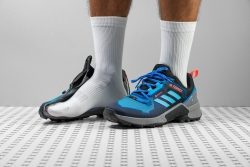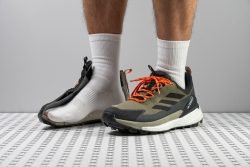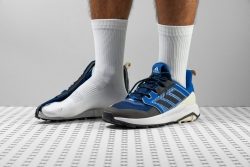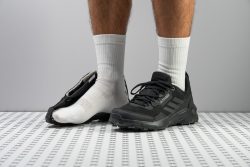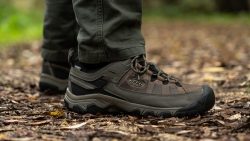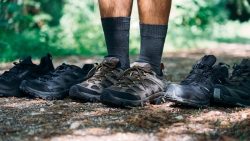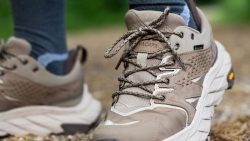4 Best Adidas Hiking Shoes in 2025
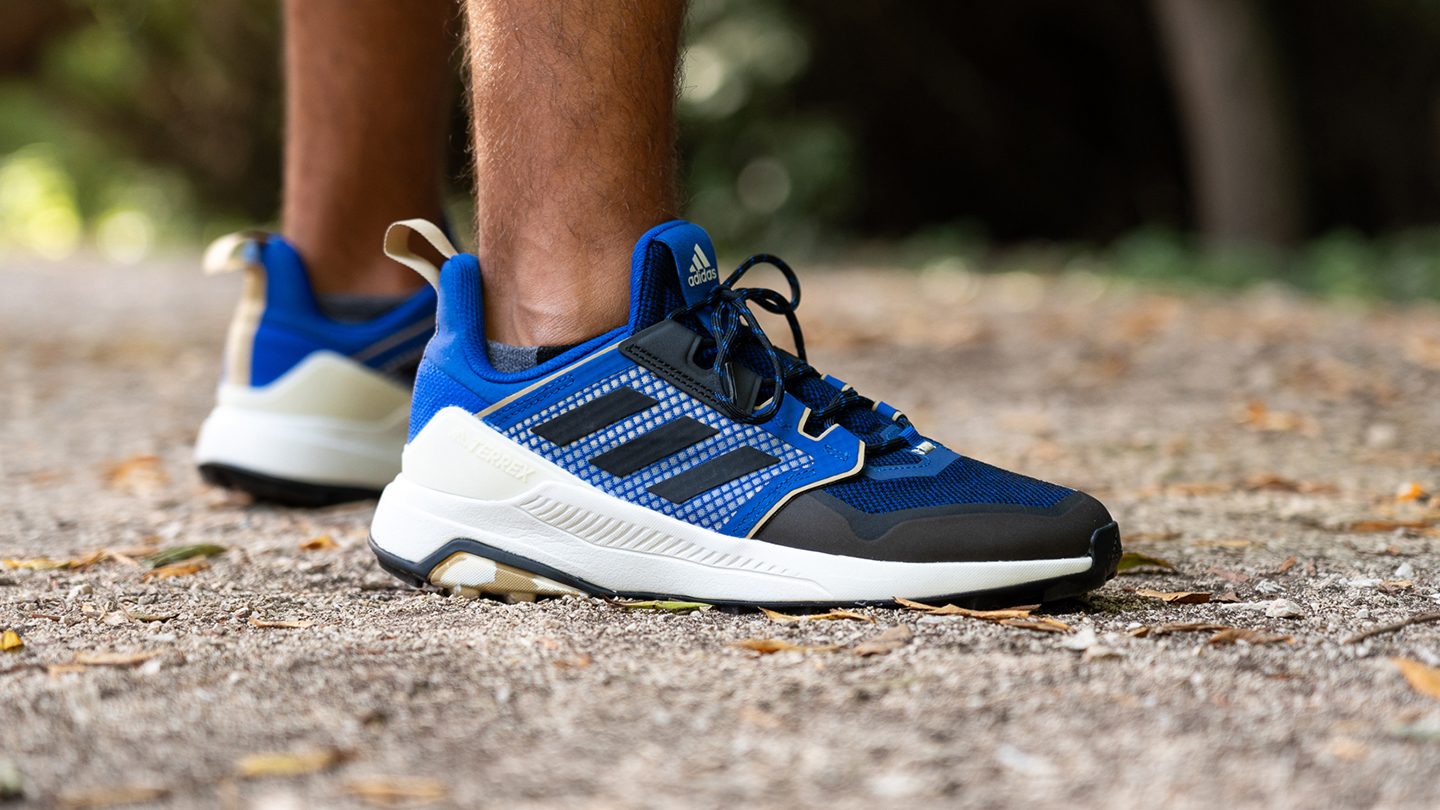
We buy shoes ourselves. We earn commissions when you buy through us, at no extra cost. Why trust us
When it comes to hiking shoes that underscore athleticism, you can’t go wrong with Adidas.
We’ve tested Adidas hiking shoes to provide you with our top picks. Not only that, but we also put them through rigorous testing in our lab, which resulted in more than 20 data points that accurately describe each Adidas hiking shoe.
So, whether you need a great all-rounder, an Adidas hiker that makes you go faster, or perhaps a highly affordable pair, we’ve got them all here.
How we test Adidas hiking shoes
At RunRepeat, we deliver only honest footwear reviews. Here is our approach:
- We buy Adidas hiking shoes with our own money. This allows us to publish unbiased reviews.
- We go on multiple hike sessions with every Adidas kick. Each shoe goes through a particular process unique to its area of expertise, gauging every pair in various terrain and weather conditions.
- We test Adidas hiking shoes' breathability, traction, durability, flexibility, shock absorption, outsole hardness, and other features in our lab. We also measure all the details, like lug depth, stack heights, and insole thickness.
Best Adidas hiking shoes overall
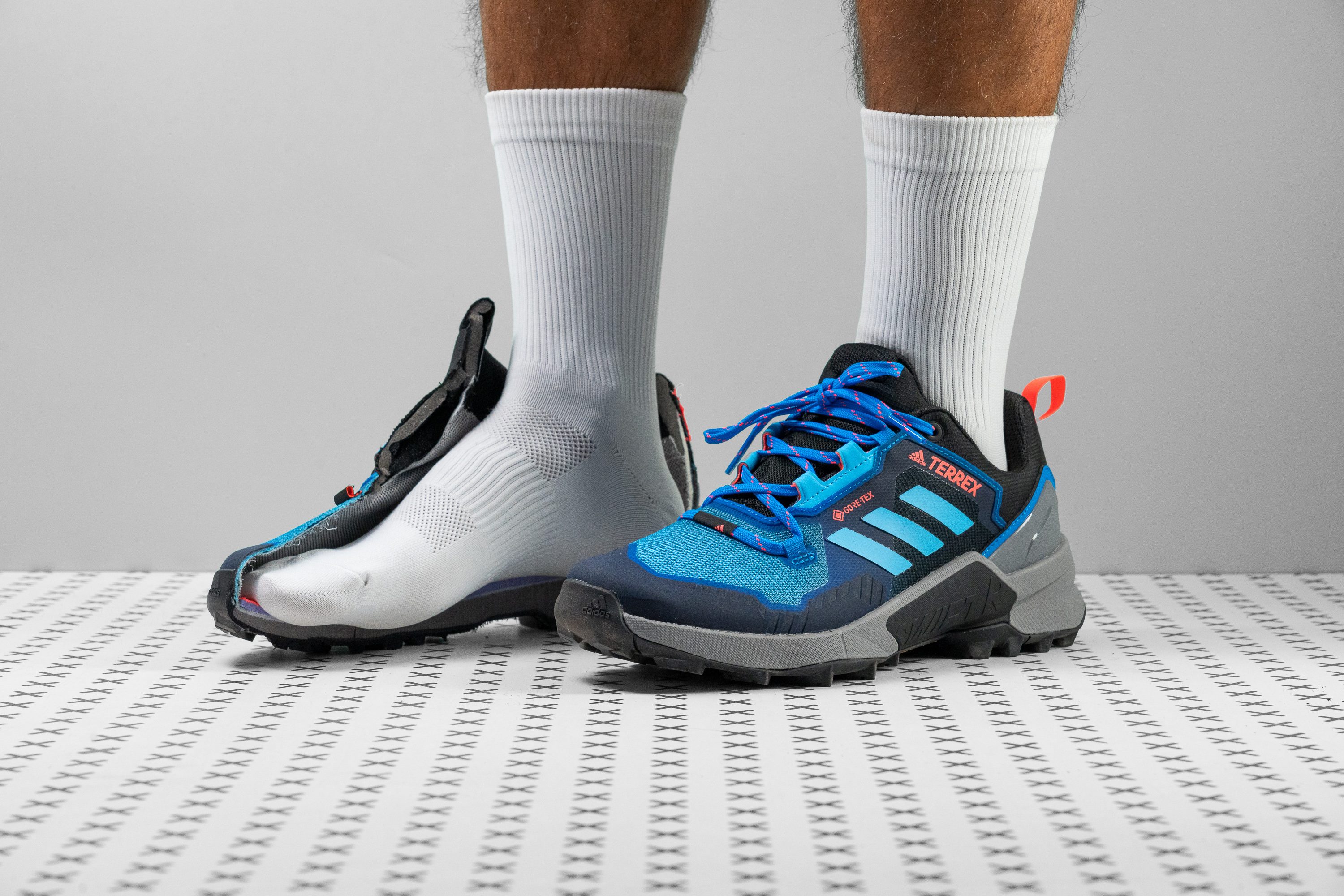













































What makes it the best?
It's very cushioned and comfortable. Its structure is as stable as it gets. Its grip is superb. Its Gore-Tex membrane works like a charm. And that's why we choose the Adidas Terrex Swift R3 GTX as the best overall hiking shoe from Adidas.
This shoe scored a perfect 5/5 on the torsional rigidity test, which means that it is very stiff and almost impossible to twist, even a little bit. Its structured support can't be denied and keeps our feet well-planted on various terrains.
On the bottom of the shoe it reads "Lugs 4.5 mm". In the lab, our caliper measurements confirmed this, they are indeed 4.5 mm thick. They are not just thicker than average but their bite is very secure. We appreciated that especially when going downhill.
With a heel stack height of 36.6 mm (the average is 33.5 mm) and a footbed that's 18% softer than the average, this is a very comfortable hiking shoe. We noticed that our feet experienced much less fatigue after hikes, especially the longer ones. We definitely attribute this generous cushioning and stability.
When testing the shoe, we did not plan for it but we ended up doing a rather rainy hike. Our feet and socks remained completely dry.
We don't recommend this shoe to hikers who want the straight-out-of-the-box level of comfort. When a shoe has the stability of the boot, it asks for some break-in.
Pros
- Boot-like stability
- Highly durable and protective
- Lightweight for what it offers
- Excellent waterproofing
- Breathable for a GTX shoe
- Responsive ride
- Very secure foothold
- Great grip and deep lugs for mixed terrain
Cons
- Stuffy for summer
- Can be too stiff (even stiffer in cold)
- Break-in needed
Adidas hiking shoes with the best shock absorption
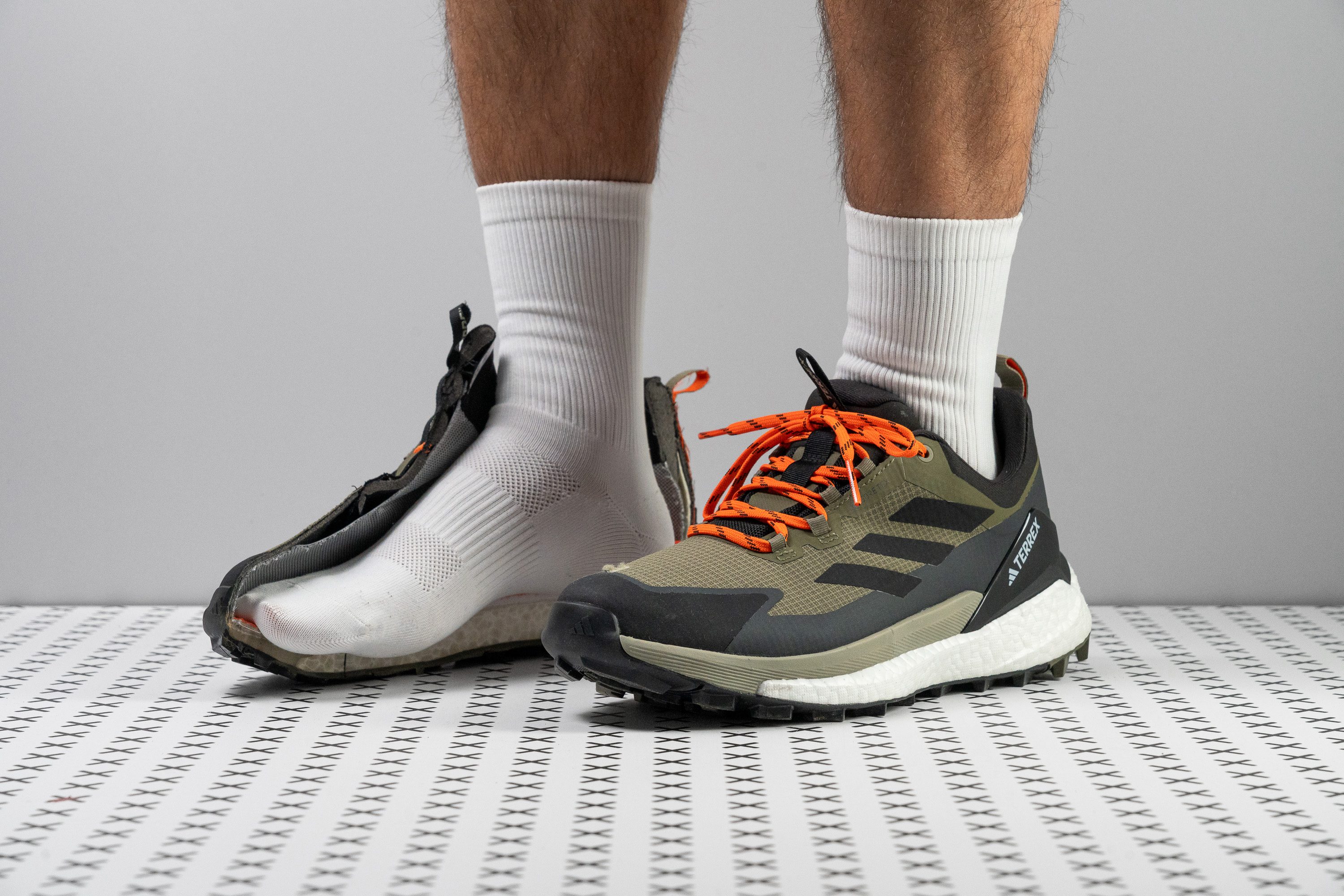



















































What makes it the best?
Among Adidas hiking shoes, we felt the safest and the freshest with the Terrex Free Hiker 2.0 Low GTX. Testing in the lab further proves how it offers the best shock absorption for hiking through its impact-reducing yet stable base, robust upper, and durable yet effectively grippy outsole. Contrary to its athletic looks, this shoe is an armored beast.
Our feet were effectively elevated and isolated from rocky objects thanks to this shoe’s massive and supportive cushioning. Our caliper confirms it’s an above-average 37.2/24.6 mm, with a very firm 38.5 HA carrier to enhance stability. This firm foam generates lateral support and serves as another shield underfoot. Shock absorption is out of this world with its high 126 SA rating. Meanwhile, the force we put into the shoe is returned in the form of springiness that reduces the force we have to exert, proven by its solid 65.9% score.
The upper delivers consistent waterproofing in the trails and the lab. We had no instances of getting our feet wet, and it received the lowest 1/5 breathability rating in our smoke test.
Underfoot, the Continental Rubber is a beast of its own. Our Dremel barely affected it, with only 0.4 mm damage vs. the 1.0 mm average. When tackling technical terrain, the deep 6.7 mm in the heel served as our brakes while the 3.6 mm lugs in the midfoot and forefoot enhanced versatility and control.
We don’t recommend this pair for easier routes because its heavy 15.7 oz (445g) is overkill. This shoe thrives in challenging environments.
Pros
- Well-cushioned and responsive
- A ton of impact protection
- Rockered sole makes the ride smoother
- Barely gets firmer in low temperatures
- Excellent support and side-to-side stability
- Top-notch waterproofing
- Highly durable (especially the outsole)
- Ideal grip for technical terrain
- Sustainable materials (20%)
Cons
- Much heavier than average
- TPU heel clips may cause rubbing
Best lightweight Adidas hiking shoes
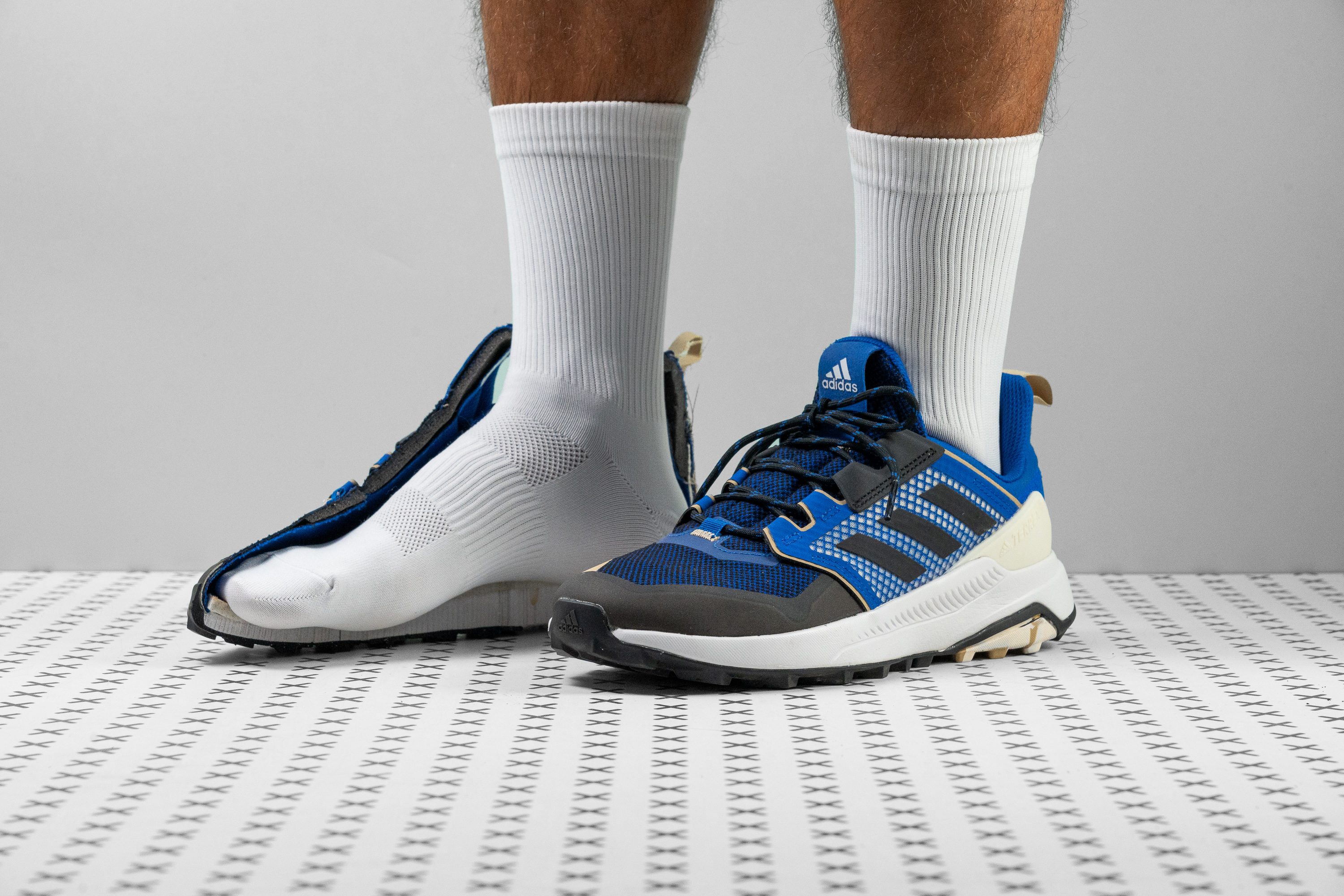












































What makes it the best?
Adidas’ Terrex range has a new front runner. The Adidas Terrex Trailmaker took the prize as the best lightweight Adidas hiking shoe! Not only is it way lighter than the other Adidas hiking shoes in the lineup, but it incorporates supportive cushioning along with a good amount of ground feel, and it caters to the wide-footed hikers among us.
The Terrex Trailmaker is by far the most lightweight shoe in the Adidas hiking shoe range. Popping it on our scales in the lab, it clocked in at a slight 12.7 oz (361g). 1.2 oz (34g) lighter than the average hiking shoe, it even manages to shave 12% off the weight of the Terrex Swift R3 GTX! This shoe is perfect for long day hikes when every ounce counts.
Measuring 30.6 mm, the heel stack is 3 mm lower than average, while the forefoot is around the average at 21 mm. With a lower-than-average drop of 9.6 mm, hikers who enjoy the sensation of the ground passing beneath them will appreciate the additional ground feel that this slimmed-down midsole provides. Protection is still present - our durometer measurements showed the midsole measures 29.5 HA, only 4% softer than average. On our hikes, our feet still felt supported and protected from sharp objects, whilst enjoying the soft cushioning to the max.
The Adidas Terrex Trailmaker looks after wide feet. At the widest point, the forefoot, we measured the shoe to be 3.7 mm wider than average, and it gets better the further forward we go. Instead of narrowing quickly around the toes like many shoes, the Trailmaker remains 3.2 mm wider than average at the big toe. We enjoyed the extra wiggle-room for our toes, especially on hot days!
In our experience, the Trailmaker isn’t for use on wet grass, mud or ice. The lugs are pretty slim, measuring just 3.4 mm, which is 0.9 mm less than average, so we don’t recommend them for technical hiking.
Pros
- Extra lightweight
- Amazing in-shoe comfort
- Highly breathable
- Balance of cushion and ground feel
- Stable for a light shoe
- More flexible than average
- Welcomes wide feet
- Secure lockdown (bootie upper)
Cons
- Outsole lacks durability
- Not enough grip on wet terrain
Adidas hiking shoes with the best energy return
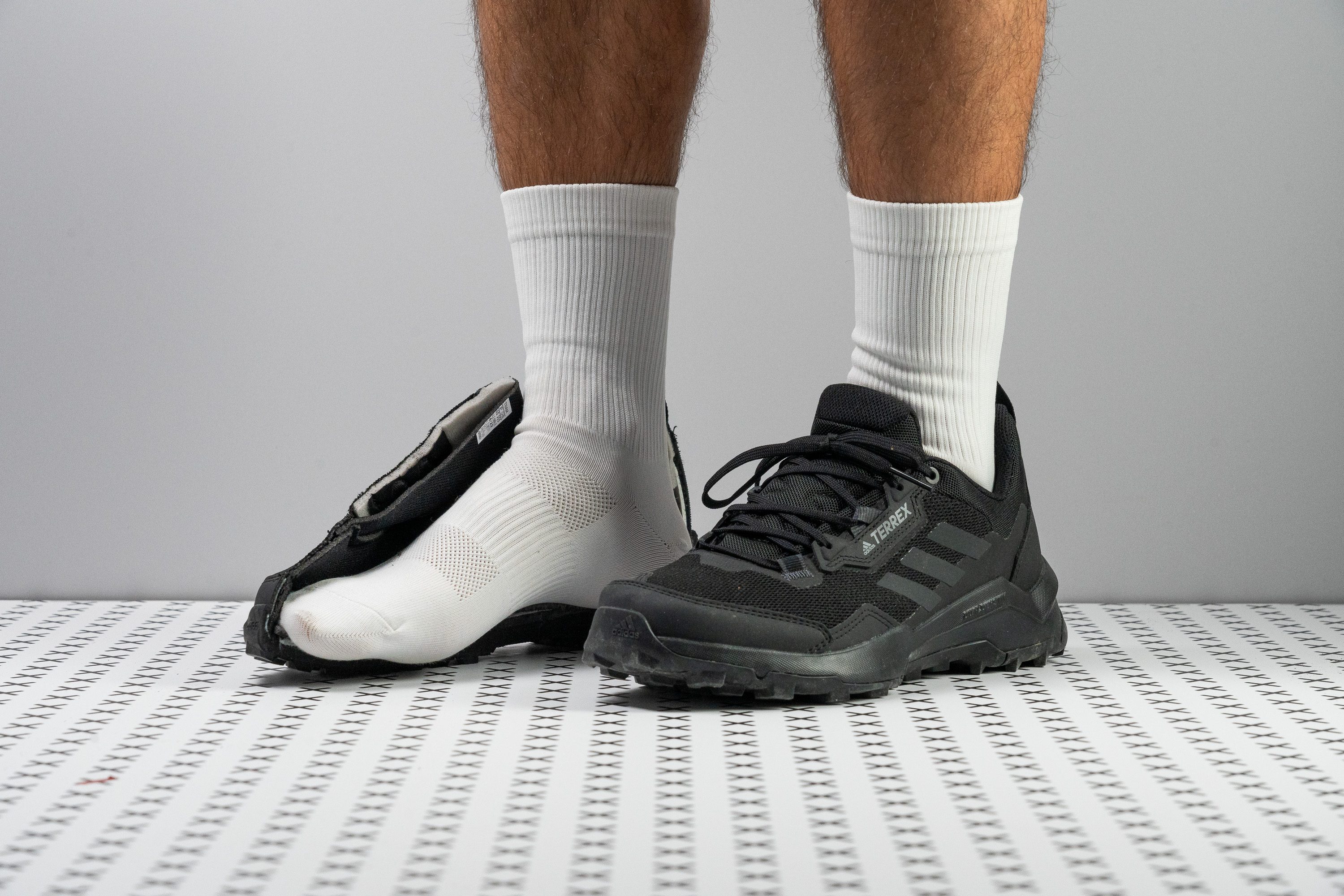






































What makes it the best?
The Adidas Terrex AX4 offers unmatched speed and agility, with a feel similar to that of a trail shoe because of its flexible nature. Lab results show its intentionally designed outsole enhances control, yet its responsiveness stands out, making it our Adidas hiking shoe with the best energy return.
Terrex AX4 can go fast, and the midsole can keep up with its solid 54.4% score in our energy return test. The platform keeps going without counting the hours on our feet.
Terrex AX4 allows us to adapt so easily to various slopes and terrains because of its loose build. Our bend test shows it needs only 14.2N to reach 30 degrees, 22.4% less than what the average hiking shoe requires. The way we don’t have to fight the shoe’s resistance boosts comfort as well.
The outsole features a heel brake and 3.7 mm chevron lugs offering solid grip. We never felt like losing control, while its moderate-sized lugs make it versatile enough for walks around town and manicured paths.
Unfortunately, its toebox has a pronounced taper, so we can’t recommend the Terrex AX4 to those with wide or high-volume feet.
Pros
- Excellent value for money
- Feels like a trail running shoe
- Breathable
- Water-repellent
- Excellent grip
- Durable for the price
- Stable platform
- Contains recycled materials
Cons
- Lacks toe protection
- Flimsy insole
- Aggressively tapered toebox
Adidas – an abbreviation for “all day I dream about sports”– has been at the forefront of athletic footwear since the dawn of man, or at least it feels that way. It came as no surprise to us that Adidas would eventually get involved hiking footwear industry.
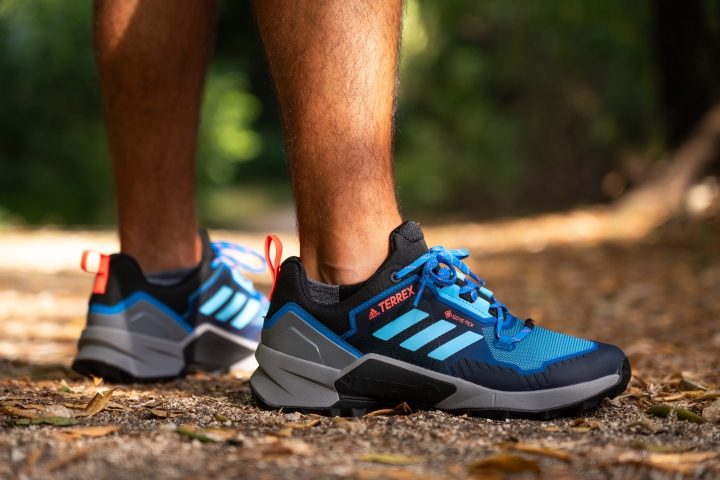
And now, Adidas hiking shoes are some of our favorites.
Core components of Adidas hiking shoes
Adidas hiking shoes are well-known for their high-quality construction. Compared to other hiking shoes, these shoes are famous for their outsoles, midsoles, and hyper-durable materials.
Rugged outsoles
Terrex hiking shoes come with rugged outsoles for increased traction on off-road terrains, such as dirt, gravel, mud, snow, and ice.
The size of the lugs on the outsole along with the pattern of the lug profile, are specifically designed for certain surfaces and intended activities. Most Adidas hiking shoes will come equipped with an all-terrain lug profile, ideal for a variety of surfaces.
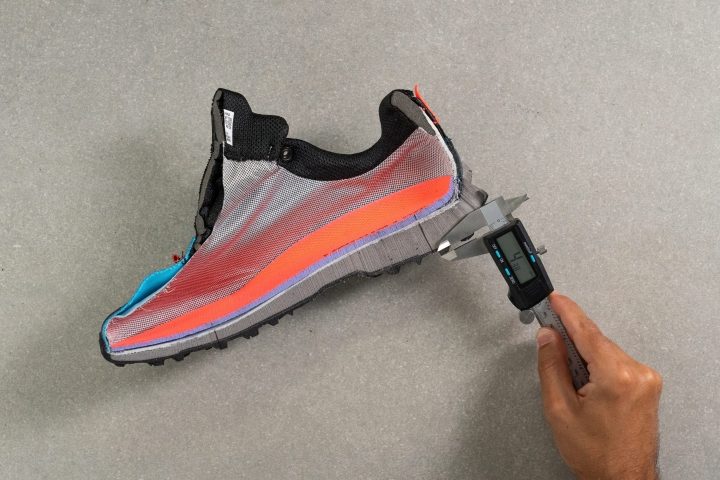
- Deeper lugs facilitate traction in loose terrain.
- Wide-spaced lugs prevent mud from building up
- Uni-directional lugs help push forward and grip on steep uphills.
- Aggressive lugs under the heel help you brake and slow down on descents.
To further enhance the performance of their outsoles, over ten years ago, Adidas Terrex began collaborating with Continental. Their goal was to improve the grip of their hiking shoes. Since then, Adidas Terrex outsoles that utilize Continental rubber offer 30% more traction.
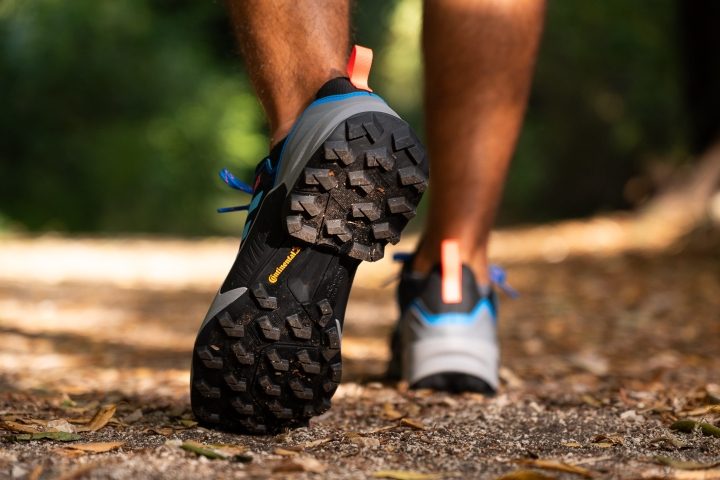
The Continental rubber also features exceptional durability and wear resistance!
Cushioned midsoles
Hiking shoes are designed to cushion your feet against prolonged stretch on off-road surfaces. Cushioning in the midsole prevents foot fatigue, which allows you to hike farther distances and at faster speeds. Cushioning also protects your feet from sharp objects, like roots and rocks.
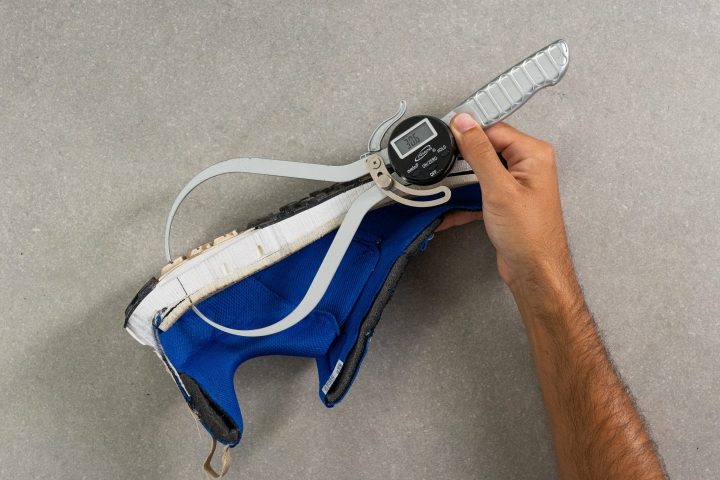
The majority of the Adidas hiking shoes in this article use ethylene vinyl acetate (EVA) foam in the midsole. EVA foam is an ideal material for midsoles because it’s lightweight and excellent at absorbing shock.
Some foams are softer than others. It is up to you to decide whether you want a firmer and more stable ride...
...or a plusher one.
Protective uppers
Hiking shoes are built to protect your feet from rocky terrain and harsh weather. Terrex hiking shoes come with sturdy and protective uppers made with durable materials. For example, all Adidas hiking shoes will come with protective toe guards.
We test the durability of all Adidas hikers with a Dremel to let you know which ones truly stand out
For waterproofing, Adidas hiking shoes utilize Gore-tex (GTX). Gore-tex is the industry leader in waterproof materials. Gore-tex is the gold standard because it repels water from entering from the outside, even when submerged. At the same time, Gore-tex allows the moisture inside your shoe, your sweat, to evaporate from inside.
Permeability comparison between a non-GTX shoe and a GTX shoe
How to decide which Adidas Terrex hiking shoe is best for you
Thus far, we’ve done our best to guide your decision-making regarding selecting an Adidas hiking shoe. To do so, we devised categories like best overall, best waterproof, and best value. But what else should you consider when selecting a hiking shoe?
Terrain type
Picking the best shoe for you depends on the terrain you enjoy hiking. For example, do you need a shoe for easier trails on flat or rolling terrain? Or technical trails with steep sections and loose terrain?
- Easy to moderate trails are characterized by relatively even and stable surfaces, such as fire roads and well-maintained single-track trails. This trail is typically found in larger open areas, like valleys and meadows.
- Technical and advanced rails are characterized by uneven terrain with rocks, roots, steps, off-camber terrain, and steep inclines and declines. These trails are commonly found in mountainous areas with undulating terrain.
- Hiking off maintained trails is characterized by uneven, unstable, and highly technical terrain. These trails often include scrambling and water crossings.
For easy to moderate terrain, lightweight, flexible, and cushioned hiking shoes may be the best choice. For example, the Adidas Terrex Trailmaker or Adidas Terrex Hikster.
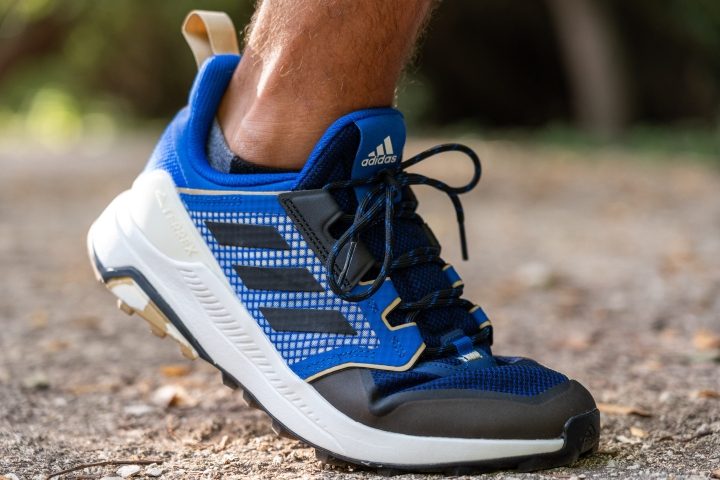
On the other hand, stiffer hiking shoes that offer more stability may be better for highly technical and advanced terrain. Hiking shoes with extra reinforcements like heel protectors and rubber toe caps can also be advantageous. For example, the Adidas Terrex Swift R3.
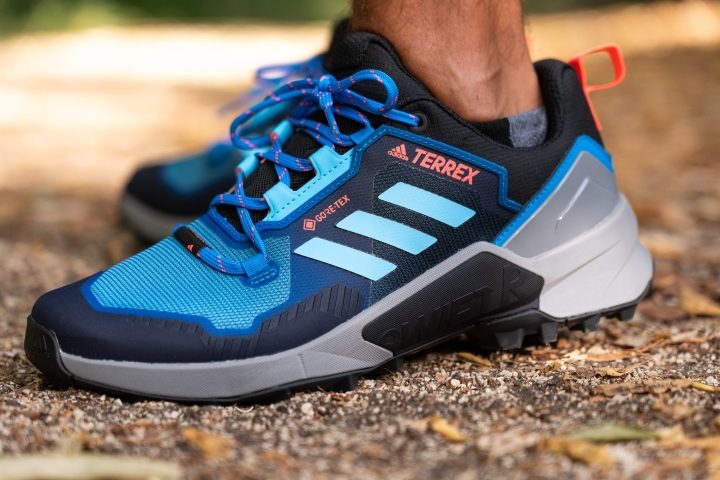
Weight of your load
Another item to consider when selecting a hiking shoe is the typical weight you carry. Do you prefer shorter day hikes with a light backpack? Are you buying shoes for a multi-day backpacking trip? Or do you typically go hiking with only your car keys and cell phone?
In general, cushioned, flexible, and lightweight shoes are okay for light loads, so long as the terrain allows. On the other hand, if you frequently have heavier loads, a stiffer shoe may be preferred.
Duration of your hiking efforts
Deciding if the hiking you prefer is long or short is somewhat subjective. A one-hour hike on terrain characterized as easy may feel long and hard for one person and easy for another. That’s why we think your fitness and experience level dictate how easy or hard something really is.
Nonetheless, it’s helpful to consider these parameters. Then you can pick an Adidas Terrex hiking shoe that provides the cushioning, support, and traction required for typical hiking adventures. For example, if you prefer light and fast-speed hiking, go with the Terrex AX4.
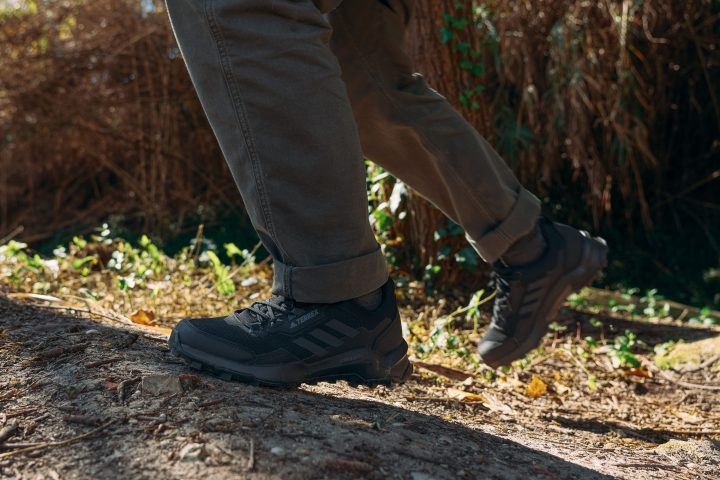
The local climate
The last factor you might consider when investing in a new pair of hiking shoes is the local climate. Is it hot and dry? Do you frequently hike in the rain? Do you love winter hiking?
The climate you hike in will tell you a lot about the footwear you should wear.
If you frequently hike in the rain or snow, selecting a Gore-tex hiking shoe will be advantageous. However, if you primarily hike and dry weather, waterproofing may not be necessary. You may be better off with a shoe that breathes well and ventilates your feet.
Trying on Adidas Hiking Shoes
Trying on hiking shoes can be an involved process. Here are some tips to help you find the pair that fit your feet the best.
- Order multiple pairs. When you do your shopping online, it can be tricky to know your size, especially if you are trying a new model from Adidas. That’s why we recommend buying multiple pairs in different sizes to see which fits best.
- Try shoes on towards the end of the day. Over the course of the day, it’s normal for our feet to swell. So for the most accurate fit, try your shoes on after they have had time to swell.
- Wear them around the house. Getting a feel for new shoes and letting your feet warm up to the shoe can tell you a lot about how it will fit. That’s why we recommend wearing new Adidas hiking shoes around the house.
- Try your shoes with socks. Using the style of sock, you plan to wear with the shoe will tell you a lot about how it will fit. For the most accurate experience, try the shoe with whichever socks you intend to use.
- If you fall between sizes, go with the larger pair. A slightly larger shoe will accommodate foot swell. Also, compared to a shoe that is too small, it’s an easier issue to fix with slightly thicker socks or a different insole.
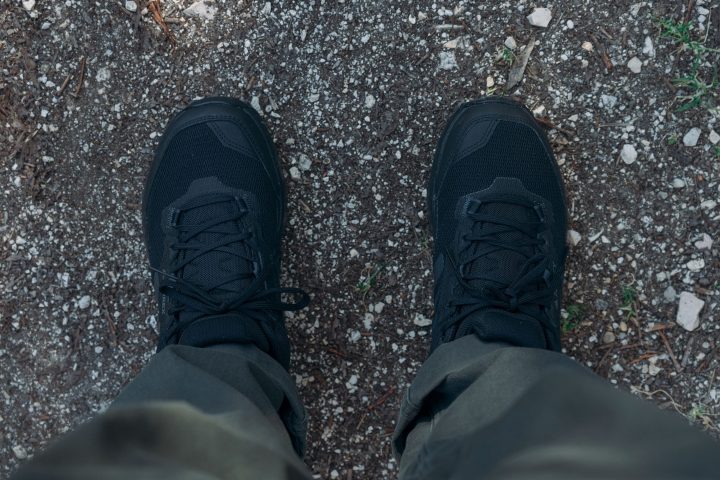
About Adidas Terrex
Adidas got involved in hiking and trekking footwear in the 1970s. At the time, Adidas was already a high-performance gear company. However, Adidas’ founder, Adi Dassler, wanted to develop something new for Adidas. In particular, Dassler wanted to create adventure-oriented footwear.
In the late 1970s, a subsidiary of Adidas, Adidas Outdoor, started gaining traction. This was made possible by supporting iconic mountaineer Reinhold Messner with lightweight and durable shoes for his climbing adventures. Messner would later become one of the first to summit Mount Everest without supplemental oxygen.
In 2009, Adidas produced its first full line of outdoor garments and footwear. As you can imagine, it was a massive hit.
Later, in 2011, Adidas officially introduced Terrex, a collection of outdoor performance gear and footwear focused on blending form, function, and sustainability.
Now, the Terrex lineup of footwear is an industry icon. Terrex is specifically designed for hiking and trail running. Terrex shoes come with various footwear innovations that separate them from Adidas’ other shoe lineups. Terrex shoes are an excellent choice for offroad use, whether it be a casual and sunny day hike or an endurance effort in wet and cold conditions.
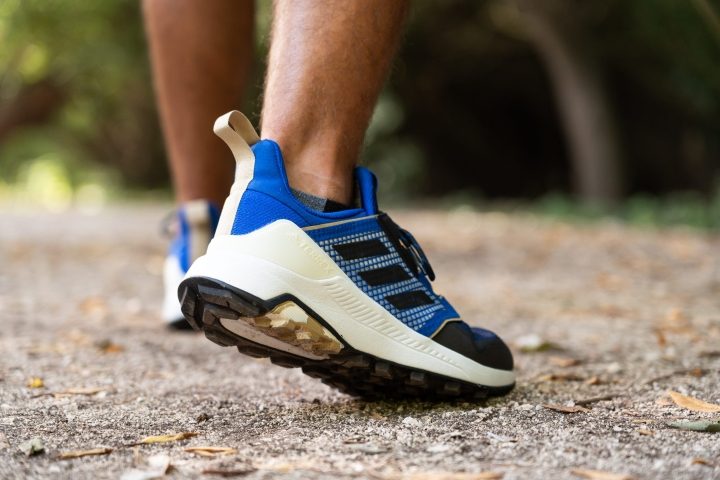
Adidas’ Commitment to Sustainability
Rethinking their materials
Adidas is committed to a future that prioritizes sustainable shoe manufacturing. For Adidas, innovation is the solution to a more sustainable footwear industry.
Adidas is rethinking the standard materials they use. They are expanding their portfolio of materials and fabrics to include recycled and natural materials. As well as exploring new innovative and sustainable materials.
By 2024, Adidas will replace virgin polyester with recycled polyester wherever possible. By 2025, 9 out of 10 footwear articles will contain a sustainable material.
Redesigning their process
Adidas is also interested in designing its manufacturing processes. In particular, they are attempting to remove excess waste from the process. Cutting down on waste is the inspiration behind their Made to be Remade campaign.
Instead of throwing away your Adidas hiking shoes after you’ve thrashed them on 1,000s of miles of trail, you can return them to Adidas. Adidas will clean the shoes, shred them, melt them down, and remake the materials into something new.
Reducing their footprint
Adidas wants to reduce the size of its carbon footprint. To do so, they methodically measure carbon emissions produced by the shoe manufacturing process. The results of their measurements taken from the complete life cycle of the products are then provided to the consumer in full transparency.
To show their commitment to reducing their carbon footprint Adidas, in collaboration with Allbirds, created the first pair of performance running shoes with less than 3kg of CO2 emissions.
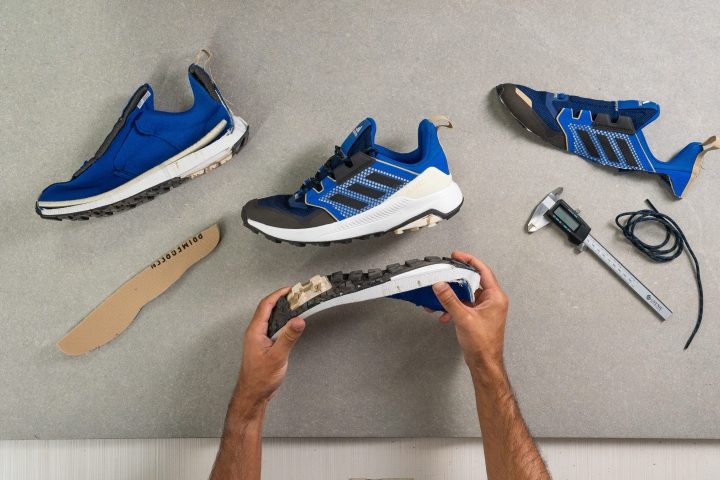
Frequently Asked Questions
Are all Adidas Terrex hiking shoes waterproof?
Several models of Adidas Terrex hiking shoes are waterproof. For example, the Swift R3 comes equipped with a Gore-tex membrane on the interior of the shoe.
Other models are water-repellent. This means that they are designed to repel small amounts of moisture, like light rainfall. However, they should not be submerged.
Are Adidas Terrex hiking shoes good for running?
Terrex hiking shoes can be used for light trail running. However, they truly shine as dedicated hiking shoes. For more focused trail running, you may be better off with a pair of Adidas trail running shoes.
Adidas Terrex running shoes are designed to balance support, traction, and durability in off-road contexts. The Terrex shoes that are designed specifically for trail running are the Terrex Agravic, Terrex Soulstride, Terrex Speed, and Terrex Two.

